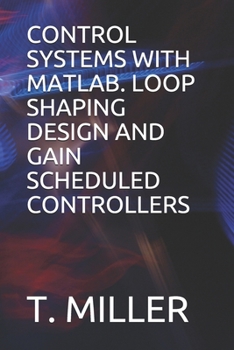Control Systems with Matlab. Loop Shaping Design and Gain Scheduled Controllers
Control systems are tuned to meet your specific performance and robustness goals subject to feasibility constraints such as actuator limits, sensor accuracy, computing power, or energy consumption. The library of tuning goals lets you capture these objectives in a form suitable for fast automated tuning. This library includes standard control objectives such as reference tracking, disturbance rejection, loop shapes, closed-loop damping, and stability margins. Using these tools, you can perform multi-objective tuning of control systems having any structure. MATLAB use the basic workflow of tuning feedback loops with the looptune command. looptune is similar to systune and meant to facilitate loop shaping design by automatically generating the tuning requirements. The looptune command provides a quick way to tune MIMO feedback loops. When the control system is modeled in Simulink, you just specify the tuned blocks, the control and measurement signals, and the desired bandwidth, and looptune automatically sets up the problem and tunes the controller parameters. looptune shapes the open-loop response to provide integral action, roll-off, and adequate MIMO stability margins.Gain scheduling is an approach to control of nonlinear systems using a family of linear controllers, each providing satisfactory control for a different operating point of the system. Gain-scheduled control is typically implemented using a controller whose gains are automatically adjusted as a function of scheduling variables that describe the current operating point. Such variables can include time, external operating conditions, or system states such as orientation or velocity.Gain-scheduled control systems are often designed by choosing a small set of operating points, the design points, and designing a suitable linear controller for each point. In operation, the system switches or interpolates between these controllers according to the current values of the scheduling variables. Gain scheduling is most suitable when the scheduling variables are external parameters that vary slowly compared to the control bandwidth, such as the ambient temperature of a chemical reaction or the speed of a cruising aircraft. Gain scheduling is most challenging when the scheduling variables depend on fast-varying states of the system. Because local linear performance near operating points is no guarantee of global performance in nonlinear systems, extensive simulation-based validation is required.
Format:Paperback
Language:English
ISBN:1698929277
ISBN13:9781698929279
Release Date:January 1
Publisher:Independently Published
Length:200 Pages
Weight:0.66 lbs.
Dimensions:0.5" x 6.0" x 9.0"
Customer Reviews
0 rating





